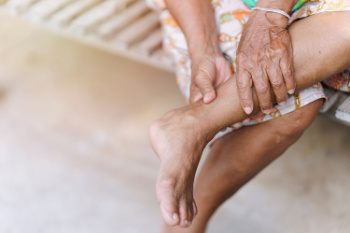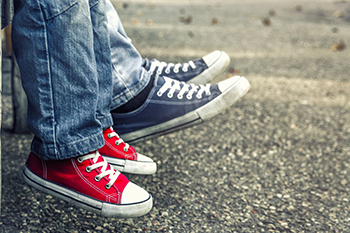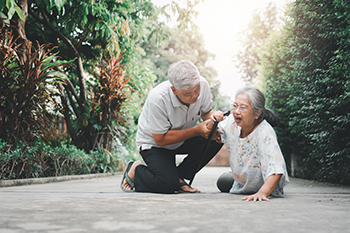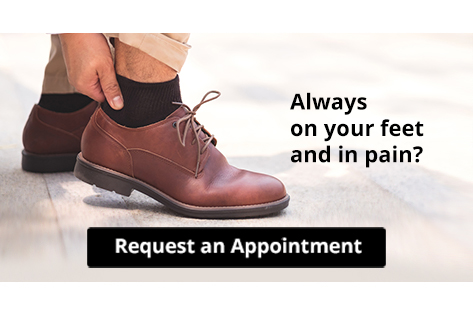Connect With Us
Blog
Items filtered by date: January 2024
Nurturing Your Feet for Fall Prevention

As one ages, the importance of foot care becomes paramount for falls prevention. Start by selecting supportive footwear with slip-resistant soles to navigate slick surfaces with confidence. Regularly inspect your feet for any signs of discomfort, changes, or potential issues that may compromise stability. Moisturize to prevent dryness, as cracked skin may lead to instability. Incorporate gentle stretching exercises to maintain flexibility, enhancing overall balance and coordination. Mindful foot hygiene, including regular washing and drying, helps ward off infections that could affect mobility. Stay vigilant in choosing appropriate footwear for different activities, ensuring a snug fit and proper arch support. By embracing these foot care practices, you can create a solid foundation for fall prevention. Falling can impact the feet, and as these practices are implemented, falling mishaps may be prevented. If you are looking for additional falls prevention techniques, it is suggested that you schedule an appointment with a podiatrist.
Preventing falls among the elderly is very important. If you are older and have fallen or fear that you are prone to falling, consult with Zina Cappiello, DPM from Dr. Zina B. Cappiello DPM, LLC. Our podiatrist will assess your condition and provide you with quality advice and care.
Every 11 seconds, an elderly American is being treated in an emergency room for a fall related injury. Falls are the leading cause of head and hip injuries for those 65 and older. Due to decreases in strength, balance, senses, and lack of awareness, elderly persons are very susceptible to falling. Thankfully, there are a number of things older persons can do to prevent falls.
How to Prevent Falls
Some effective methods that older persons can do to prevent falls include:
- Enrolling in strength and balance exercise program to increase balance and strength
- Periodically having your sight and hearing checked
- Discuss any medications you have with a doctor to see if it increases the risk of falling
- Clearing the house of falling hazards and installing devices like grab bars and railings
- Utilizing a walker or cane
- Wearing shoes that provide good support and cushioning
- Talking to family members about falling and increasing awareness
Falling can be a traumatic and embarrassing experience for elderly persons; this can make them less willing to leave the house, and less willing to talk to someone about their fears of falling. Doing such things, however, will increase the likelihood of tripping or losing one’s balance. Knowing the causes of falling and how to prevent them is the best way to mitigate the risk of serious injury.
If you have any questions, please feel free to contact our office located in Clifton, NJ . We offer the newest diagnostic and treatment technologies for all your foot care needs.
The Essence of Proper Foot Health

Proper foot health is the cornerstone of overall well-being, laying the foundation for a life of mobility and comfort. At its core, everyday foot care involves maintaining cleanliness and hygiene, with regular washing and drying to prevent infections. It also entails the choice of wearing appropriate footwear, ensuring a balance between comfort, support, and style. Routine inspections for signs of potential issues, such as ingrown toenails or calluses, play a pivotal role in proactive foot care. A regular moisturizing routines prevents dryness and cracking, while fostering skin health. Incorporating gentle exercises and stretches into daily routines strengthens muscles and promotes flexibility, contributing to the prevention of common foot ailments. If you have developed a foot problem that causes pain or discomfort, it is suggested that you make an appointment with a podiatrist.
Everyday foot care is very important to prevent infection and other foot ailments. If you need your feet checked, contact Zina Cappiello, DPM from Dr. Zina B. Cappiello DPM, LLC. Our podiatrist can provide the care you need to keep you pain-free and on your feet.
Everyday Foot Care
Often, people take care of their bodies, face and hair more so than they do for their feet. But the feet are a very important aspect of our bodies, and one that we should pay more attention to. Without our feet, we would not be able to perform most daily tasks.
It is best to check your feet regularly to make sure there are no new bruises or cuts that you may not have noticed before. For dry feet, moisturizer can easily be a remedy and can be applied as often as necessary to the affected areas. Wearing shoes that fit well can also help you maintain good foot health, as well as making it easier to walk and do daily activities without the stress or pain of ill-fitting shoes, high heels, or even flip flops. Wearing clean socks with closed shoes is important to ensure that sweat and bacteria do not accumulate within the shoe. Clean socks help to prevent Athlete’s foot, fungi problems, bad odors, and can absorb sweat.
If you have any questions please feel free to contact our office located in Clifton, NJ . We offer the newest diagnostic and treatment technologies for all your foot and ankle needs.
Choosing Children’s Footwear

Children's footwear plays a pivotal role in supporting the healthy development of their feet and gait as they grow. The flexibility and sole firmness of children's shoes influence their feet and gait development. Compared to being barefoot, wearing shoes increases stride and step length, while decreasing cadence. It also affects parameters like support base, toe-off time, double support time, stance time, and single support time. Moreover, it influences the range of motion in the hip, knee, and ankle joints. As your child enters the stage where picking appropriate shoes is important, it is suggested that you schedule an appointment with a podiatrist for specific shoe recommendations for your child’s unique foot type to ensure healthy and safe growth and development.
The health of a child’s feet is vital to their overall well-being. If you have any questions regarding foot health, contact Zina Cappiello, DPM of Dr. Zina B. Cappiello DPM, LLC. Our podiatrist can provide the care you need to keep you pain-free and on your feet.
Tips for Keeping Children's Feet Healthy
- Make sure their shoes fit properly
- Look for any signs of in-toeing or out-toeing
- Check to see if they have Clubfoot (condition that affects your child’s foot and ankle, twisting the heel and toes inward) which is one of the most common nonmajor birth defects.
- Lightly cover your baby’s feet (Tight covers may keep your baby from moving their feet freely, and could prevent normal development)
- Allow your toddler to go shoeless (Shoes can be restricting for a young child’s foot)
- Cut toenails straight across to avoid ingrown toenails
- Keep your child’s foot clean and dry
- Cover cuts and scrapes. Wash any scratches with soap and water and cover them with a bandage until they’ve healed.
If you have any questions, please feel free to contact our office located in Clifton, NJ . We offer the newest diagnostic and treatment technologies for all your foot care needs.
Common Risks of Falling

As people age, even a minor fall can lead to serious consequences, including injury, disability, or worse. Annually, an alarming 36 million falls occur in adults over 65, making fall prevention essential. Unfortunately, the leading risk factor for falls in older adults is a history of prior falls. Muscle weakness and gait abnormalities are risk factors for falls. In addition, foot, knee, or back pain, weight changes, and lack of sleep can increase the risk. Prior injuries also increase the risk. Many health conditions amplify the risk of falling, especially in older adults. Among them are inner ear problems, poor vision, and dementia. Further, a vitamin D deficiency, arthritis, osteoporosis, and neurological diseases can pose problems that make falling more likely. Medications can also play a role. Blood pressure meds may cause postural hypotension, and certain sleep products are linked to memory problems and higher fall risk. Prevention of falls involves home modifications, regular exercise, and medical checkups. For additional guidance on how to keep from falling, it is suggested that you schedule an appointment with a podiatrist.
Preventing falls among the elderly is very important. If you are older and have fallen or fear that you are prone to falling, consult with Zina Cappiello, DPM from Dr. Zina B. Cappiello DPM, LLC. Our podiatrist will assess your condition and provide you with quality advice and care.
Every 11 seconds, an elderly American is being treated in an emergency room for a fall related injury. Falls are the leading cause of head and hip injuries for those 65 and older. Due to decreases in strength, balance, senses, and lack of awareness, elderly persons are very susceptible to falling. Thankfully, there are a number of things older persons can do to prevent falls.
How to Prevent Falls
Some effective methods that older persons can do to prevent falls include:
- Enrolling in strength and balance exercise program to increase balance and strength
- Periodically having your sight and hearing checked
- Discuss any medications you have with a doctor to see if it increases the risk of falling
- Clearing the house of falling hazards and installing devices like grab bars and railings
- Utilizing a walker or cane
- Wearing shoes that provide good support and cushioning
- Talking to family members about falling and increasing awareness
Falling can be a traumatic and embarrassing experience for elderly persons; this can make them less willing to leave the house, and less willing to talk to someone about their fears of falling. Doing such things, however, will increase the likelihood of tripping or losing one’s balance. Knowing the causes of falling and how to prevent them is the best way to mitigate the risk of serious injury.
If you have any questions, please feel free to contact our office located in Clifton, NJ . We offer the newest diagnostic and treatment technologies for all your foot care needs.
See Your Podiatrist Regularly If You Work On Your Feet
Understanding a Diabetic Foot Blister

A diabetic foot blister, a manifestation of the complexities associated with diabetes, emerges as a consequence of heightened vulnerability to skin injuries. Diabetes, a metabolic condition affecting blood sugar regulation, often leads to impaired circulation and compromised nerve function in the extremities. This diminished sensation, known as diabetic neuropathy, means that individuals with diabetes may not readily detect friction or pressure that can result in blisters. When blisters form, the impaired circulation slows the healing process, making these normally benign lesions potential precursors to more severe complications. The risk of infection in a diabetic foot blister is elevated, posing a serious threat to foot health. Regular foot inspections, meticulous hygiene practices, and appropriate footwear choices become paramount for individuals navigating the delicate balance of diabetes. If you have developed this type of blister, it is strongly suggested that you are under the care of a podiatrist who can guide you toward correct treatment methods.
Blisters are prone to making everyday activities extremely uncomfortable. If your feet are hurting, contact Zina Cappiello, DPM of Dr. Zina B. Cappiello DPM, LLC. Our podiatrist can provide the care you need to keep you pain-free and on your feet.
Foot Blisters
Foot blisters develop as a result of constantly wearing tight or ill-fitting footwear. This happens due to the constant rubbing from the shoe, which can often lead to pain.
What Are Foot Blisters?
A foot blister is a small fluid-filled pocket that forms on the upper-most layer of the skin. Blisters are filled with clear fluid and can lead to blood drainage or pus if the area becomes infected.
How Do Blisters Form?
Blisters on the feet are often the result of constant friction of skin and material, usually by shoe rubbing. Walking in sandals, boots, or shoes that don’t fit properly for long periods of time can result in a blister. Having consistent foot moisture and humidity can easily lead to blister formation.
Prevention & Treatment
It is important to properly care for the affected area in order to prevent infection and ease the pain. Do not lance the blister and use a Band-Aid to provide pain relief. Also, be sure to keep your feet dry and wear proper fitting shoes. If you see blood or pus in a blister, seek assistance from a podiatrist.
If you have any questions, please feel free to contact our office located in Clifton, NJ . We offer the newest diagnostic and treatment technologies for all your foot care needs.

